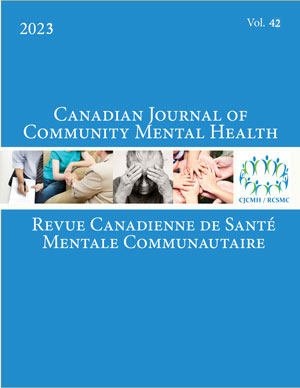Volume 24 • Number 1 • April 2005
OPEN ACCESS
This study aimed to identify the characteristics of current Canadian intervention programs designed to support father involvement. Sixty-one projects in the 10 provinces constituted the sample. Results show that most of the projects operate on limited budgets. The activities they offer mostly target fathers themselves to the exclusion of key people in their social environment. The discussion underscores the strenghts and weaknesses of father support programs, and guidelines for future intervention in this area are proposed.
OPEN ACCESS
Sheway is a single-access comprehensive street-front service to pregnant and parenting women with a history of alcohol and/or drug abuse that is located in one of Canada's poorest neighbourhoods, the Downtown Eastside of Vancouver. This investigation assesses the concurrent health and social problems clients report upon entry into the program, service utilization, and the impact of services on neonate and infant well-being. Data were collected through the review of files from the 9 ½ years of the agency's service. Findings suggest that the clients' concurrent health and social problems have increased over the years of operation while indicators of infant health have either improved or maintained steady rates.
OPEN ACCESS
Une plus grande efficience dans le fonctionnement en réseau des ressources en santé mentale peut être visée par des formations croisées impliquant des échanges de personnel. Les intervenants et intervenantes peuvent ainsi acquérir une meilleure connaissance des ressources du territoire et y guider leur clientèle de manière plus adéquate. En 2003, l'Hôpital Douglas, les Centres locaux de services communautaires (CLSC) et les organismes communautaires du sud-ouest de Montréal ont mené un projet-pilote d'échange de personnel impliquant 14 équipes et 21 intervenants et intervenantes. L'analyse de questionnaires auto-administrés ainsi que le contenu d'un focus group indiquent une très grande satisfaction face au projet. Les moyens pour assurer la confidentialité de l'information sur la clientèle, le contenu des stages et l'orientation des formations représentent toutefois des thème où certaines divergences ont été exprimées. Une très forte demande pour la participation aux stages offerts, de même que le niveau élevé de satisfaction de la part des participants et participantes témoignent de la pertinence de nouvelles séries de rotations de personnel. Celles-ci pourraient être élargies afin d'améliorer la continuité des services offerts aux personnes ayant des troubles concomitants de santé mentale et de toxicomanie.
OPEN ACCESS
Perceived need for mental health care, professional help-seeking, use of self-help groups, and reasons for not seeking professional care for mental health problems were investigated in the Canadian Community Health Survey (N = 129,543). Regional differences were found for all variables. The greatest level of Perceived Need Without Seeking Help, Professional Help-Seeking, and Use of Self-Help Groups were found in the Yukon/Northwest Territories/Nunavut. These findings likely reflect rural isolation and differences in socioeconomic levels associated with different regions in Canada. Regional differences indicate that efforts to improve the delivery of care need to be tailored to specific areas in Canada.
OPEN ACCESS
A needs assessment for mental health respite services was undertaken at Waterloo Regional Homes for Mental Health in Kitchener, Ontario. Twenty-seven participants (consumers, carers, and service providers) were asked about their perceptions of the need for mental health respite services, and about their preferences for a model of respite in their community. A convergent analysis of participants' responses leads to one possible model of respite, while a divergent analysis considers program and value dilemmas for potential planners of programs directed at multiple stakeholders. Participants' frustrations with current services remind mental health programs of the importance of consulting with all stakeholders as they evaluate and develop programs.
OPEN ACCESS
Cette étude porte sur les représentations sociales de la grossesse à l'adolescence. Dix-huit focus groups sont menés auprès de 150 filles et garçons, âgés de 15 à 17 ans. Une analyse de contenu qualitative met en relief 4 dimensions (émotive, réflexive, psychobiologique et économico-sociale) et 4 prises de position (négative, positive, ambivalente, dynamique), autour desquelles s'organisent 4 types de significations accordées à la grossesse à l'adolescence: la grossesse-problème, la grossesse-projet, la grossesse-tension et la grossesse-pouvoir. Quelques avenues en matière de pratiques éducatives sont abordées, notamment l'importance d'aller au-delà des messages alarmistes, d'instaurer un dialogue ouvert avec et entre les jeunes et de tabler sur le soutien social et l'entraide.
OPEN ACCESS
This paper explores women's choice of controlled drinking or abstinence goals in harm reduction treatment programs for alcohol use problems. Situated within debates about controlled or abstinence goals for alcohol use, this research project provides a specific focus on women's treatment needs. We explore evidence which reveals that women in treatment for alcohol problems often hold deeply internalized dominant social ideologies on addiction. Results demonstrate that while offered the choice of abstinence or controlled use goals, most women defined themselves as “addicts,” adopted a disease metaphor of “addiction,” and chose abstinence. The findings here raise questions about whether or not clients receive sufficient education about harm reduction and controlled drinking and make adequately informed choices.
OPEN ACCESS
Multidisciplinary teamwork is increasingly considered the ideal way to provide mental health services. This is especially the case when working with children or families. However, there is little easy-to-use information available to help practicing professionals recognize and overcome barriers to working in multi-disciplinary settings. There are even fewer resources intended for use across disiplines. This paper offers a practical approach to help mental health professionals identify barriers to teamwork and create solutions to those barriers.










